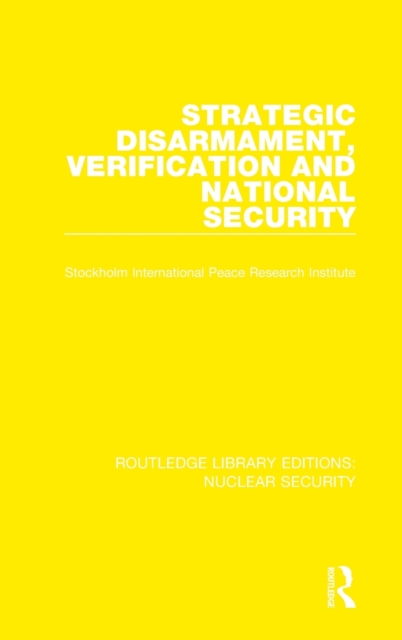
Strategic Disarmament, Verification and National Security Hardback
by Stockholm International Peace Research Institute
Part of the Routledge Library Editions: Nuclear Security series
Hardback
Description
Originally published in 1977, the purpose of this book was to analyse the relationship between the security of two states mutually undergoing strategic disarmament at the time and the need for safeguarding their security by means of a verification system.
The book thus studies some of the basic problems in the disarmament debate, issues that had been the subject of great political controversy. Previous studies had been mainly descriptive or historical, lacking in objective political analysis, and tending to political bias, depending on the political school of the author.
There was thus some justification for the statement made by some outstanding authorities in the field that 'to date, no systematic analysis has been attempted to determine what disarmament measures would optimally require of verification methods...' Our ambition is to respond to this criticism, at least so far as the strategic context of disarmament is concerned. Chapter 1 introduces us to the enormous range of repercussions caused by a disarmament agreement.
Chapter 2 examines the concept of verification, analysing the meaning of the term, presenting various definitions of what verification is and attempting to systematize the concept. It has been noted on many occasions that the verification set up in a disarmament treaty is only one of a number of factors working towards compliance with a treaty.
In fact the role of verification in presenting the treaty, and therefore the security of its participants, is to a large extent limited.
However, without many other conditions being satisfied verification on its own can do little to preserve the treaty regime.
Chapter 3 discusses these conditions. Chapter 4 gives a brief analysis of the concept of national interests in general, and the concept of national security in particular. Among all the elements of 'security', it is military security that plays by far the largest role. Because of this. Chapter 5 considers a specific case of strategic military security, in which security, defined as stable strategic deterrence between two states, is analysed. Finally, Chapter 6 analyses the question of what happens to security based on strategic deterrence when states enter into the disarmament process.
More specifically, the role of verification in preserving security in such circumstances is analysed, thereby answering the main problem of the book.
The supporting data for Chapter 6 is given in the Appendix.
Information
-
Out of stock
- Format:Hardback
- Pages:190 pages
- Publisher:Taylor & Francis Ltd
- Publication Date:02/12/2020
- Category:
- ISBN:9780367511616
Other Formats
- PDF from £24.29
- EPUB from £24.29
- Paperback / softback from £29.99
Information
-
Out of stock
- Format:Hardback
- Pages:190 pages
- Publisher:Taylor & Francis Ltd
- Publication Date:02/12/2020
- Category:
- ISBN:9780367511616










